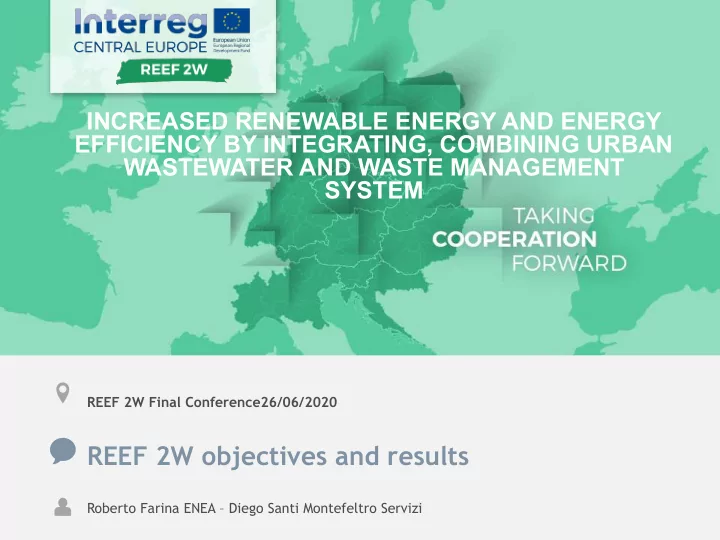

INCREASED RENEWABLE ENERGY AND ENERGY EFFICIENCY BY INTEGRATING, COMBINING URBAN WASTEWATER AND WASTE MANAGEMENT SYSTEM REEF 2W Final Conference26/06/2020 REEF 2W objectives and results Roberto Farina ENEA – Diego Santi Montefeltro Servizi
WHY THIS PROJECT Energy consumption in the water cycle In USA the energy consumed to provide drinking water and ensure the treatment of the waste water correspond about the 3% of the total electric energy consumption of the country (US EPA 2006) TAKING COOPERATION FORWARD 2
WHY THIS PROJECT Potential energy recoverable from wastewater There is more energy in wastewater than is needed for treatment about 5X more But not only from wastewater. Energies recoverable from solar radiation, hydraulic power, gasification and incineration processes is considered TAKING COOPERATION FORWARD 3
WHY THIS PROJECT Chemical energy recovery Secondary Oxidation Primary settler Tank settler Wastewater Treated water Chemical energy content % Primary sludge Secondary sludge Electric energy 14 20 Thermal energy CHP Unit Digested sludge Anaerobic digestor TAKING COOPERATION FORWARD 4
REEF 2W PROJECT REEF 2W project involves 5 countries (IT , AT , DE, CZ, HR), 10 • Partners and 3 associated partners REEF 2W was the only project of the call involving 5 • private companies in the activities of the project Started in June 2017duration 36 month • • TAKING COOPERATION FORWARD 6
SCOPE OF THE PROJECT To identify possible critical points for the energy efficiency of • the WWTPs Help to define strategies and technologies and evaluate possible • future scenarios for the waste treatment platforms integrating waste, wastewater and other renewable energy sources To provide an assessment on the excess of energy available and • where it can be delivered as electricity, heat, biofuel, biomethane to the nearby community to decrease its energetic impact. To provide a simple interactive TOOL able to help policy makers • and stakeholders to define the health state of the treatment plant and to identify possible improvements TAKING COOPERATION FORWARD 7
SCOPE OF THE PROJECT To provide an environmental assessment of the actions • implemented To provide an economic assessment for the implementation of • different technologies Identify obstacles and barriers for the implementation of more • efficient system to recovery energy from organic wastes Involve local authorities to test the tool, and use it to contribute • at a better design of the energetic planning TAKING COOPERATION FORWARD 8
PILOT SITES 5 pilot sites have been identified and studied; to evaluate • technical solutions, social and legislative barriers and obstacles Involved in the pilots: • Small and big municipalities • Waste and wastewater treatment plants • IT: SWTP Novafeltria • HR: WWTP Zabok • AT: WWTP RHV Trattnachtal • CZ: WWTP Prague • DE: WWTP Berlin • TAKING COOPERATION FORWARD 9
PILOT SITES Technologies considered are • Anaerobic digestion, biogas upgrading, power to gas, CHP • Heat recovery from treated wastewater • Gasification, Hydrothermal carbonization, composting, • incineration Photovoltaic, thermal and hybrids panels • Hydroelectric power • Others will be possible to implement in future (effects of • nutrients recovery, filtration technologies, wind, etc.) TAKING COOPERATION FORWARD 10
INTEGRATED SUSTAINABILITY ASSESSMENT (ISA) ISA approach has been used to connect all the relevant aspects: • Energy assessment • Spatial assessment • Environmental assessment • Economic assessment • Strong involvement of the user in collecting available data and • defining future credible scenarios TAKING COOPERATION FORWARD 11
LOGICAL SCHEME OF THE TOOL (Inter)national Electrical Grid Urban Center Thermal Energy Ozonization Hydropower Effluent WWTP FORSU Platform + Ozone Co-Subustrate Generation (Solid/Liquid) Primary Secondary Pre-Treatment Electric Energy Sludge Sludge External Secondary Sludge Thermal Hydrolysis Liquid Fraction Pasteurisation Liquid Fraction Wind Energy Flare Separator Anaerobic Solid/Liquid DIgestion Solar Energy HTC Photovoltaics Biogas Energy Hydrochar Agricoltural Use Incineration Water Biogas Treatment Electrolysis Composting CHP BIOGAS Upgrading Biogas Methane Hydrogen Oxygen Landfill Off Gas Atmosphere CO2 Distribution Mono-Incineration CO2 Methanation Phosphorus Recycling Gassification Syngas Methane TAKING COOPERATION FORWARD 12 Local Grid / Compression Biofuel (Inter)national Grid Leachate Removal
REEF 2W TOOL TAKING COOPERATION FORWARD 13
REPORT TAKING COOPERATION FORWARD 14
FURTHER ACTIONS Involvement of Public Administrations and Stakeholders Training courses for groups of Public Administrations and • Stakeholders have been delivered in the 5 countries to help them in the evaluation of possible opportunities to decrease the energy impact recovering energy from wastes Training courses will be conducted to train advisors • (Reef2w@gmail.com) Setting up of action plans at a regional levels to promote the use • of REEF 2W approach in energy and waste planning and signature of MoUs with political authorities Book with the description of the experience developed in the • project TAKING COOPERATION FORWARD 15
Thank You for your attention REEF 2W Team TAKING COOPERATION FORWARD 16
Contact details Name: Roberto Farina www.interreg-central.eu/reef-2w mailto: reef2w@gmail.com Roberto.farina@enea.it Off.: +39 0516098580 https://www.facebook.com/Reef2w/ https://twitter.com/ProjectREEF2W TAKING COOPERATION FORWARD 17
Recommend
More recommend